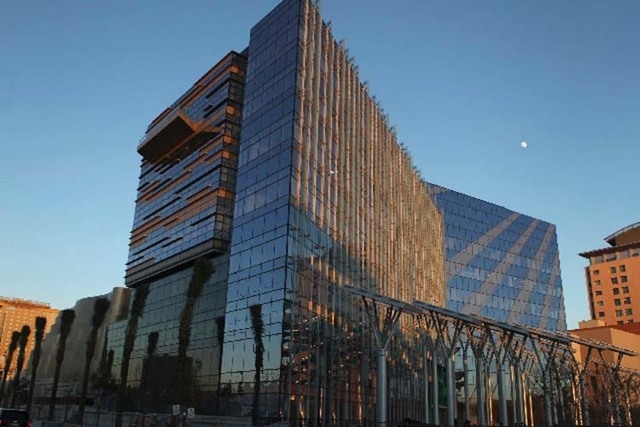Motives behind proposed Las Vegas whistleblower rules questioned
If you’re ready to blow the whistle on someone or something at Las Vegas City Hall, you might want to wait a few weeks. Or else do it as soon as possible.
If you do it sooner, you stand a good chance of catching the city off guard.
If you wait to file a complaint through a newly proposed city appeals process, that chance all but disappears.
The text of a bill introduced Wednesday aims to protect city whistleblowers from “reprisals or retaliatory action” for disclosing government misdeeds.
And a lofty goal it is.
Whistleblowers have helped bring down corrupt politicians and bankrupt policies from the Southern Nevada Regional Housing Authority all the way to the National Security Agency — which was rocked in 2013 after a now-exiled former consultant, Edward Snowden, exposed a trove of documents detailing the agency’s secret domestic spying programs.
Those doing the exposing can face forms of retaliation ranging from workplace intimidation to, in Snowden’s case, prison time — part of the reason many states and the federal government have whistleblower protection laws on the books.
But Ruben Garcia, a UNLV Boyd School of Law professor, said such bills, while meant to encourage and protect whistleblowers, often do a better job protecting employers on the lookout for lawsuits.
There’s reason to suspect that the Las Vegas bill — which would set up an internal appeals process meant to address whistleblowers’ retaliation complaints — would work the same way.
“It’s a strategic decision for the employee,” Garcia said. “Depending on how it’s set up, (the appeals process) might be beneficial to those who don’t need a full-scale lawsuit.
“But we do know, at the federal level, that these processes are used to discourage lawsuits at an administrative stage.”
Garcia said those ready to blow the whistle at City Hall already have a number of people — including union stewards and the state labor board — with whom they can file retaliation-related complaints.
He figures it’s no coincidence that Las Vegas, now 14 years removed from state-level passage of a similar whistleblower law, chose to put its ordinance up for a first read this month.
“(Retaliation lawsuits) are one of the fastest-growing areas of litigation in the country,” Garcia said. “I think it’s interesting that (Las Vegas) feels they need to do this now.”
Las Vegas officials don’t deny that the new whistleblower protection bill could save them a lot of time and money in court, where employee retaliation cases might otherwise wind up.
The bill — which seeks to replace an 8-year-old city policy protecting those who report suspected fraud — would establish a new internal appeals process overseen by a hearing officer appointed by the city manager or city attorney.
Appeals heard through the process would be limited to five types of government misdeeds — including violating city ordinances and wasting taxpayer dollars — and 13 varieties of retaliation stemming from reporting those actions.
They would have to be filed within two years of when the reportable action took place and no later than two months after the alleged instance of retaliation.
All city manager-approved claims of retaliation then would be assigned to a city-appointed hearing officer.
Those officers would be allowed to issue subpoenas requiring witnesses to testify and requiring alleged retaliators to attend a discovery conference.
They would not be able to discipline those found liable for retaliation beyond an order “directing the proper person to desist and refrain” from reprisals.
City Manager Betsy Fretwell, who would decide which cases ought to be heard by officers she appoints, said she didn’t know why the city couldn’t have written more teeth into the ordinance.
She sees the “desist and refrain” orders as more than just a slap on the wrist.
“I don’t know if there’s more the city could do,” Fretwell said. “I believe we have adequate protections for our employees now; we’re just trying to make sure we’re adequately addressing it in the ordinance the way statute asks us to.
“We’ve been fortunate, we really haven’t had this kind of an issue in quite some time.”
Nevada Employee Management Relations Board Commissioner Bruce Snyder has some guesses as to why the city’s new ordinance looks so tame.
Snyder, who heads the board charged with mediating labor disputes between local government agencies and their workers, said state law bars the city from unilaterally disciplining union employees without first negotiating those actions at the bargaining table.
“Disciplinary procedures have to be bargained for,” he said. “I don’t know how they’d be able to set this up, if it is disciplinary, without negotiating it.”
Bill sponsor Stavros Anthony said the ordinance wasn’t meant to address a specific instance — nor better identify and discipline chronic retaliators — but is just a cleanup item related to state-level whistleblower laws passed in 2001.
Anthony, who announced his bid for the mayor’s seat Tuesday, confirmed that it took more than a decade to find a sponsor for the move before it was brought to his attention a few weeks ago.
“I guess it wasn’t anybody’s priority at the time, but I thought now was the time to sponsor it,” the mayor pro tem said Monday. “We want to create an environment where employees know they can do the right thing and not face retaliation for it.”
Nothing in the bill explicitly prohibits those employees from bringing further legal or administrative action against those who retaliate against them, though the city-sponsored appeals process could give city lawyers a potentially crucial head start in preparing for any legal battles it might have to wage on behalf of an elected leader, department head or other top administrator.
City Attorney Brad Jerbic said he doesn’t think that the ordinance might discourage whistleblowers from taking their cases outside City Hall.
He didn’t dispute that it would save the city plenty of time and money defending against lawsuits.
“It creates a process where (retaliation disputes) would hopefully be resolved before costly litigation,” Jerbic said of the ordinance. “I can tell you, in general, that state law requires us to have it.
“I think policies that protect whistleblowers are good for everyone. … You don’t want to be in the middle of one of these processes and find out you’re not in compliance with state law.”
A subcommittee of Las Vegas leaders could hold a second reading of the whistleblower protection bill as soon as Feb. 2. If the bill advanced out of committee, City Council members could adopt the ordinance as early as Feb. 4.
Contact James DeHaven at jdehaven@reviewjournal.com or 702-477-3839. Find him on Twitter: @JamesDeHaven.
Housing Authority’s troubled past affects current concerns
Federal probe: Nevada housing authority owes $425,000 in back pay
Journalist: Snowden documents contain NSA ‘blueprint’




























